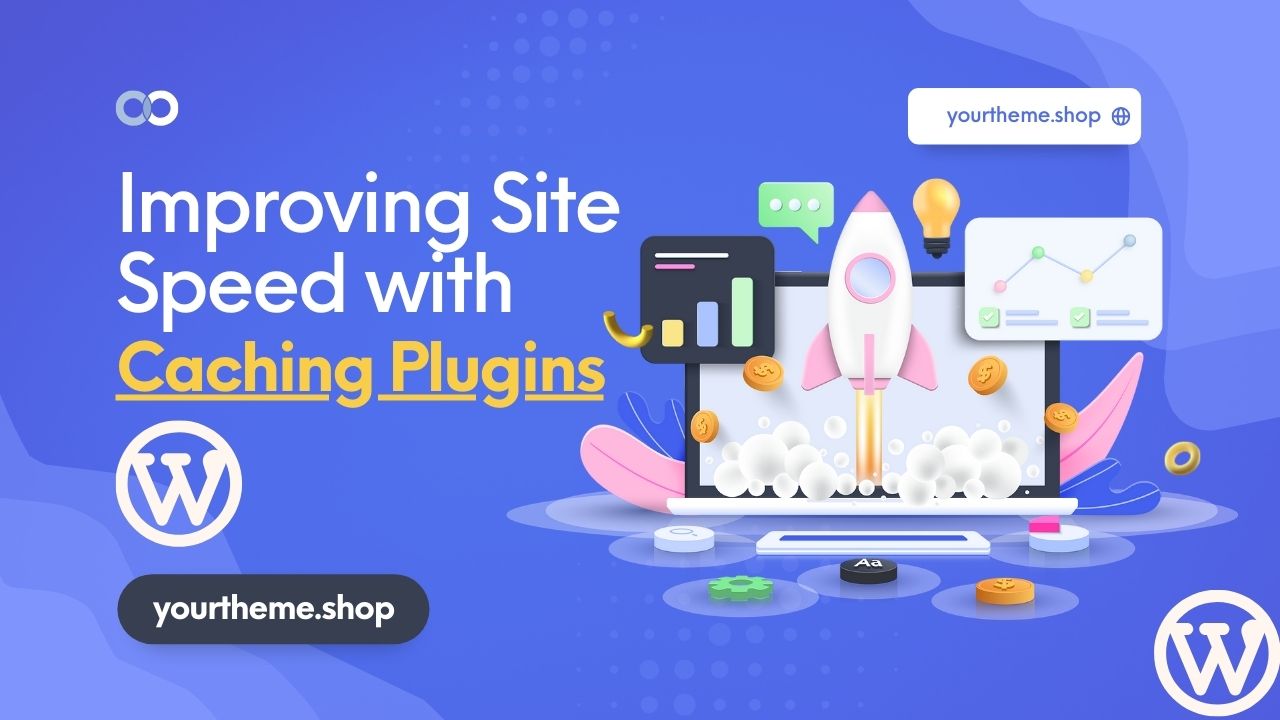In today’s digital landscape, Improving Site Speed with Caching Plugins is not just an option, but a necessity. The speed of a website significantly impacts user experience and search engine optimization (SEO). A fundamental aspect of this is understanding the role of caching in WordPress.
Improving Site Speed with Caching Plugins
Understanding How Caching Plugins Work
Improving Site Speed with Caching Plugins involves a deep dive into how caching plugins operate. These plugins store a static version of your website, reducing the load on the server and speeding up access for visitors.
Key Benefits
It significantly enhances the user experience. Websites that load quickly keep visitors engaged, reducing bounce rates and encouraging longer browsing sessions. This improvement is a direct result of How to enhance site speed using WordPress caching plugins, which streamline the loading process.
Boosting Search Engine Rankings
A critical advantage of Maximizing website speed through effective caching plugin setup is the positive impact on search engine rankings. Search engines, like Google, prioritize faster websites, leading to higher visibility and organic traffic. This is a core principle in load times with WordPress caching plugins: Best practices.
Increasing Conversion Rates
One of the most tangible benefits of Site Speed with Caching Plugins is the increase in conversion rates. Websites that load quickly provide a better user experience, encouraging visitors to make purchases, subscribe, or engage with the content. This outcome is a direct result of How to enhance site speed using WordPress caching plugins.
Detailed Insights into Caching Plugin Benefits
Reducing Server Load
Maximizing website speed through effective caching plugin setup also involves reducing the load on your server. By caching static resources, these plugins decrease the number of requests to the server, enhancing overall site performance, a key aspect of load times with WordPress caching plugins: Best practices.
Improving Mobile Performance
In the era of mobile browsing, Site Speed with Caching Plugins plays a crucial role in optimizing websites for mobile users. Faster loading times on mobile devices improve user experience and accessibility, aligning with the goals of How to enhance site speed using WordPress caching plugins.
Enhancing Site Scalability
Maximizing website speed through effective caching plugin setup contributes to the scalability of a website. As traffic grows, caching plugins help in managing the increased load without compromising on speed, an essential component of load times with WordPress caching plugins: Best practices.
Practical Applications of Caching Plugins
E-commerce Websites
For e-commerce websites, Site Speed with Caching Plugins is not just about enhancing user experience; it’s a critical factor in conversion rates. Quick loading times are essential in keeping potential customers engaged, a principle at the heart of How to enhance site speed using WordPress caching plugins.
Understanding User Expectations
In the realm of e-commerce, Maximizing website speed through effective caching plugin setup is vital. Online shoppers expect fast, responsive sites. Delays can lead to abandoned carts and lost sales.
Impact on Conversion Rates
load times with WordPress caching plugins: Best practices directly correlates with better conversion rates. Faster sites create a more enjoyable shopping experience, encouraging customers to complete their purchases.
Implementing Caching Plugins for E-commerce
Choosing the Right Plugin
When considering How to enhance site speed using WordPress caching plugins for e-commerce, selecting a plugin that can handle dynamic content typically found in online stores is crucial.
Customizing Settings for E-commerce
Maximizing website speed through effective caching plugin setup involves customizing caching settings to accommodate the unique needs of e-commerce sites, such as handling frequent inventory updates and user sessions.
Best Practices for E-commerce Site Speed
Regular Performance Audits
Adhering to load times with WordPress caching plugins: Best practices includes conducting regular performance audits. This ensures that the caching plugin remains effective as the e-commerce site evolves.
Balancing Speed and Functionality
In Improving Site Speed with Caching Plugins, it’s important to balance speed with the rich functionalities that e-commerce sites require, such as interactive product displays and customer reviews.
Advanced Caching Strategies for E-commerce
Utilizing CDN alongside Caching Plugins
Maximizing website speed through effective caching plugin setup for e-commerce sites often involves using a Content Delivery Network (CDN) in conjunction with caching plugins for optimal performance.
Database Optimization
For e-commerce sites, Improving load times with WordPress caching plugins: Best practices also includes database optimization to handle large volumes of products and transactions efficiently.
Troubleshooting Common E-commerce Caching Issues
Handling Dynamic Content
One challenge in Improving Site Speed with Caching Plugins for e-commerce sites is ensuring dynamic content like shopping carts and customer accounts are not negatively impacted.
Ensuring Seamless User Experience
In How to enhance site speed using WordPress caching plugins, it’s crucial to ensure that caching does not interfere with the user’s ability to browse and purchase products seamlessly
Content-Heavy Sites
Blogs and news sites with heavy content greatly benefit from Maximizing website speed through effective caching plugin setup. Faster load times ensure that readers access content quickly, enhancing user satisfaction, a goal of load times with WordPress caching plugins: Best practices.
Multimedia Platforms
Websites with high levels of multimedia content, such as videos and images, see significant improvements by Site Speed with Caching Plugins. These plugins help in faster rendering of media files, aligning with the strategies of How to enhance site speed using WordPress caching plugins.
How to Enhance Site Speed Using WordPress Caching Plugins
Selecting the Right Caching Plugin
When considering How to enhance site speed using WordPress caching plugins, choosing the right plugin is crucial. Factors like compatibility with your hosting environment and specific website needs should guide your choice.
Setting Up a Caching Plugin
A step-by-step guide on How to enhance site speed using WordPress caching plugins is essential. This involves installing the plugin, adjusting settings for optimal performance, and testing to ensure everything works seamlessly.
Maximizing Website Speed Through Effective Caching Plugin Setup
Configuring Caching Plugins
Maximizing website speed through effective caching plugin setup requires a strategic approach to configuration. This includes setting up page caching, browser caching, and file compression.
Advanced Techniques
In Maximizing website speed through effective caching plugin setup, advanced techniques like CDN integration and database optimization play a significant role in further enhancing site speed.
Improving Load Times with WordPress Caching Plugins: Best Practices
Troubleshooting Common Issues
Addressing issues in load times with WordPress caching plugins: Best practices is crucial. This involves regularly clearing the cache, updating plugins, and ensuring compatibility with other WordPress tools.
Maintaining Optimal Speed
In the realm of Site Speed with Caching Plugins, continuous monitoring stands as a critical practice. Regularly checking your website’s performance metrics ensures that the speed remains at an optimal level, providing the best user experience.
Assessing Site Performance
A key aspect of How to enhance site speed using WordPress caching plugins involves assessing site performance through tools like Google PageSpeed Insights. This helps in identifying areas that need improvement.
Tweaking for Enhanced Performance
Maximizing website speed through effective caching plugin setup is not a one-time task. It requires ongoing adjustments to respond to new content, updates, and changes in web technologies.
Fine-Tuning Caching Settings
Part of load times with WordPress caching plugins: Best practices includes fine-tuning caching settings. This might involve adjusting the cache lifespan, tweaking file minification settings, and optimizing the delivery of static resources.
Regular Updates for Caching Plugins
Keeping caching plugins updated is crucial in Site Speed with Caching Plugins. Updates often include optimizations and new features that can further enhance site speed.
Staying Updated with Latest Trends
In How to enhance site speed using WordPress caching plugins, staying abreast of the latest trends and updates in caching technology is vital. This ensures that your website benefits from the latest advancements in speed optimization.
Performance Checks: A Routine Necessity
Routine performance checks are a cornerstone of website speed through effective caching plugin setup. Regular checks help in early identification of issues that might slow down your site.
Utilizing Performance Check Tools
Utilizing tools for performance checks is an integral part of load times with WordPress caching plugins: Best practices. Tools like GTmetrix and Pingdom provide comprehensive insights into your website’s performance and areas for improvement.
In today’s digital era, optimizing site speed with caching plugins is paramount for enhanced user experience, SEO, and conversions. Understanding how these plugins work, their benefits, and their practical applications is essential. Choose the right plugin, configure it effectively, and stay updated with best practices to ensure your website loads fast and stays competitive.






